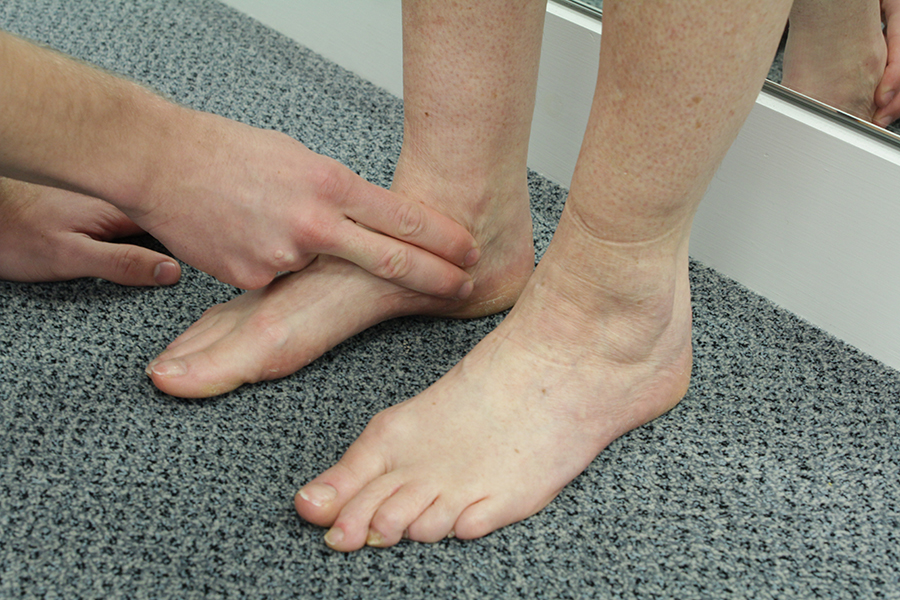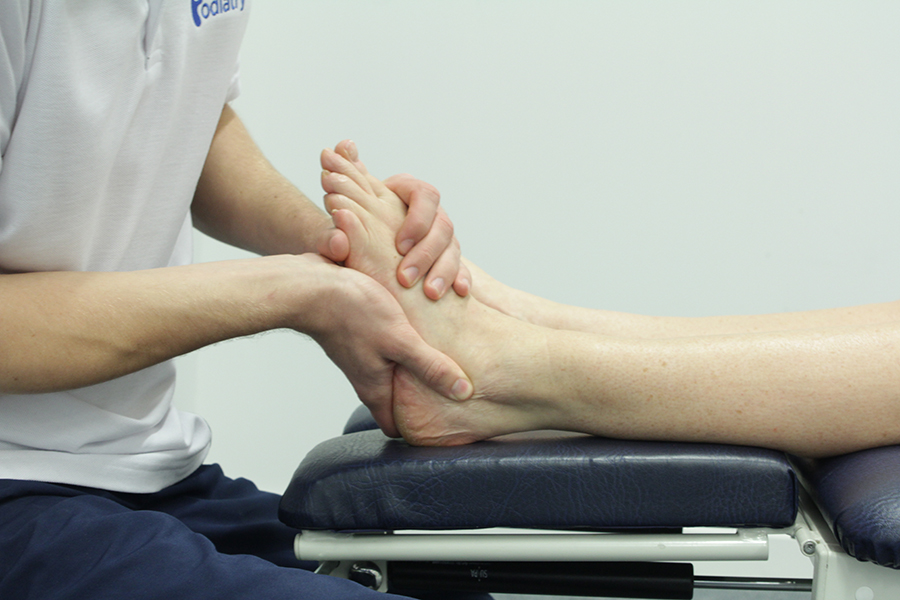Stress fracture of the medial malleoulus
A stress fracture of the medial malleolus is an injury that produces a small crack on the bony bump on the inside of the ankle; this bump is called the medial malleolus and is actually the bottom of the tibia (the larger of the two bones that form the lower leg).
If you suspect that you have a medial malleolus stress fracture visit Chiropody.co.uk. At Chiropody.co.uk we specialise in the assessment, diagnosis and treatment of a range of injuries to the lower limb. Treatment plans will be subject to a thorough assessment. Podiatric treatment aims for a medial malleolus stress fracture are; improved healing, reduced stress and pain, increased ankle, foot and leg function, increased ankle strength and flexibility, and the prevention of future injury.
A stress fracture of the medial malleolus describes a crack rather than a break in the medial malleolus; this is the bony lump on the inside of the ankle. A stress fracture to the medial malleolus is the result of excessive stress being placed on the medial malleolus, which typically occurs over time. Stress fractures to the medial malleolus are quite rare.

A medial malleolus stress fracture can occur if the force being exerted upon it is too great. Excessive forces are exerted during weightbearing activities and typically follow a sudden increase in duration, or intensity of activity. You may be more at risk of developing a stress fracture of the medial malleolus if you have the following:
If you experience any of the following signs or symptoms you may have a medial malleolus stress fracture:
A medial malleolus stress fracture can be diagnosed at Chiropody.co.uk after an assessment and an examination of the foot and ankle. You may require an X-ray to confirm the diagnosis of a medial malleolus stress fracture.
If you have a stress fracture of the medial malleolus podiatry can help you. The benefits of podiatric intervention following a stress fracture to the medial malleolus include:
Podiatric benefits may also be gained through joint mobilisation and exercise programmes. The purpose of exercise and joint mobilisation is to reduce any stiffness and improve the strength and flexibility of the ankle, allowing the ankle to be able to better stand stress in the future.

At Chiropody.co.uk treatment follows a thorough assessment. During the assessment a thorough history will be obtained and a biomechanical assessment will take place. A biomechanical assessment is necessary if you have a stress fracture of the medial malleolus so that the mechanics of the lower limb and muscle strength can be assessed. The findings of the history and biomechanical assessment will then inform treatment. All treatment plans at Chiropody.co.uk are specific to you, and may include:
A medial malleolus stress fracture describes a crack in the medial malleolus, which occurs when excessive forces have, over a period of time, been exerted upon it. If too much force is placed on the medial malleolus there is an increased risk of developing a stress fracture, although the injury is quite rare. Some people are more at risk of developing a stress fracture to the medial malleolus than others, with those who have poor lower limb and foot biomechanics being one such example.
If you have a stress fracture to the medial malleolus podiatry may be able to help you.
If you would like to make an appointment for an assessment please Email office@chiropody.co.uk or call 0330 088 4222
If you suspect that you have a medial malleolus stress fracture visit Chiropody.co.uk. At Chiropody.co.uk we specialise in the assessment, diagnosis and treatment of a range of injuries to the lower limb. Treatment plans will be subject to a thorough assessment. Podiatric treatment aims for a medial malleolus stress fracture are; improved healing, reduced stress and pain, increased ankle, foot and leg function, increased ankle strength and flexibility, and the prevention of future injury.
What is a stress fracture of the medial malleolus?
A stress fracture of the medial malleolus describes a crack rather than a break in the medial malleolus; this is the bony lump on the inside of the ankle. A stress fracture to the medial malleolus is the result of excessive stress being placed on the medial malleolus, which typically occurs over time. Stress fractures to the medial malleolus are quite rare.

What causes a stress fracture of the medial malleolus?
A medial malleolus stress fracture can occur if the force being exerted upon it is too great. Excessive forces are exerted during weightbearing activities and typically follow a sudden increase in duration, or intensity of activity. You may be more at risk of developing a stress fracture of the medial malleolus if you have the following:
- Osteoporosis
- Inadequate footwear for training purposes
- Poor lower limb biomechanics
- Participate in high impact activities
What are the signs and symptoms of a stress fracture of the medial malleolus?
If you experience any of the following signs or symptoms you may have a medial malleolus stress fracture:
- Pain that is local to the inside ankle
- Pain that increases at the inside of the ankle during weightbearing activity
- Pain on firm palpation of medial malleolus
- Limp
How is a stress fracture of the medial malleolus diagnosed?
A medial malleolus stress fracture can be diagnosed at Chiropody.co.uk after an assessment and an examination of the foot and ankle. You may require an X-ray to confirm the diagnosis of a medial malleolus stress fracture.
Benefits of podiatry for a stress fracture of the medial malleolus
If you have a stress fracture of the medial malleolus podiatry can help you. The benefits of podiatric intervention following a stress fracture to the medial malleolus include:
- Improved healing
- Improved ankle and foot function
- Reduction in ankle stiffness
- Reduction in pain
- Improvement in ankle strength and flexibility
Podiatric benefits may also be gained through joint mobilisation and exercise programmes. The purpose of exercise and joint mobilisation is to reduce any stiffness and improve the strength and flexibility of the ankle, allowing the ankle to be able to better stand stress in the future.

What would podiatry for a stress fracture of the medial malleolus involve?
At Chiropody.co.uk treatment follows a thorough assessment. During the assessment a thorough history will be obtained and a biomechanical assessment will take place. A biomechanical assessment is necessary if you have a stress fracture of the medial malleolus so that the mechanics of the lower limb and muscle strength can be assessed. The findings of the history and biomechanical assessment will then inform treatment. All treatment plans at Chiropody.co.uk are specific to you, and may include:
- Orthoses
- Strengthening programme
- Joint mobilisation
- Training review
- Advice and education
- Lipus
- Footwear review
Summary
A medial malleolus stress fracture describes a crack in the medial malleolus, which occurs when excessive forces have, over a period of time, been exerted upon it. If too much force is placed on the medial malleolus there is an increased risk of developing a stress fracture, although the injury is quite rare. Some people are more at risk of developing a stress fracture to the medial malleolus than others, with those who have poor lower limb and foot biomechanics being one such example.
If you have a stress fracture to the medial malleolus podiatry may be able to help you.
If you would like to make an appointment for an assessment please Email office@chiropody.co.uk or call 0330 088 4222
Save 5% by booking an appointment online.

Find your nearest clinic
We have clinics located throughout the North West. We also provide a home visit service.
Find out more »

No waiting lists!
Tired of waiting for treatment? Be seen by a podiatrist today!
Find out more »

Not sure how we can help?
Speak to a podiatrist to find out how we can help. Call us on 0330 088 4222.
Find out more »
We work with:

Individuals

Organisations

Health professionals
Get in Touch!
0330 088 4222
If you would like to speak to one of our specialists then please complete this form.
We are open 7 days a week








